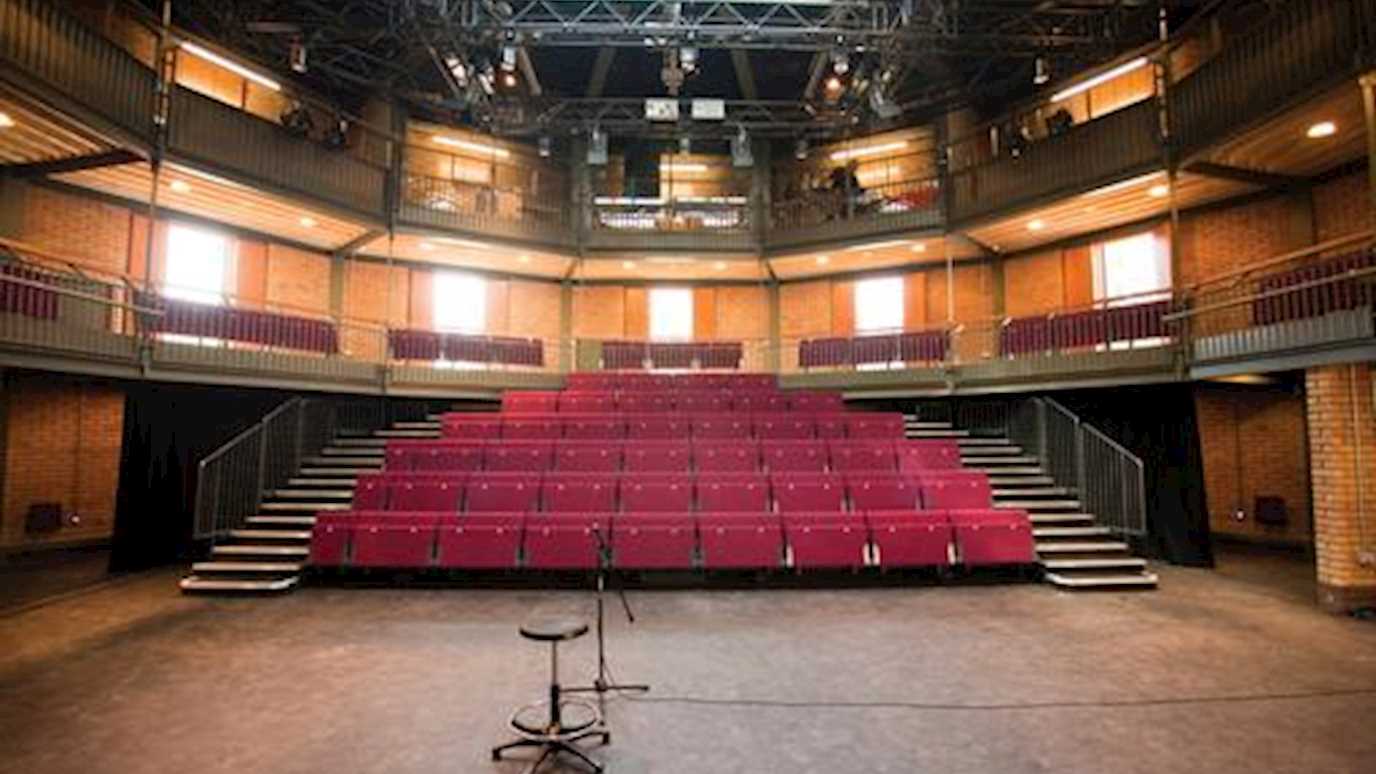This programme is currently under development and may be subject to change
Course options
Key information
Duration: 3 years full time
UCAS code: W440
Institution code: R72
Campus: Egham
The course
Drama and Theatre (BA)
BA Drama and Theatre at Royal Holloway is about more than the stage. You’ll study how performance engages with big ideas like identity, politics, power, and protest.
Learn to analyse, question, and make theatre that responds to the world around you. Balancing creative practice with critical thinking, this degree equips you to grow as a confident, versatile artist – on stage and beyond.
Take to the stage
- Learn from a teaching team with extensive experience in the field
- Explore diverse performance forms, from classical drama to contemporary, digital, and global practice
- Access professional facilities including the Caryl Churchill Theatre, Boilerhouse Theatre, rehearsal studios, and production labs
Make an impact
In your first year at Royal Holloway, you’ll take part in our Skills Lab module, designed to give you career-focused learning from the start. You’ll take part in skills workshops by staff from across the university, on topics ranging from careers and academic skills to technical theatre and digital performance.
In your final year, you’ll apply your skills in industry-focused modules like Radio Drama and Theatre for Young People. These help you reflect critically and prepare for your next steps.
Launch your career in areas such as theatre, TV, education, arts management, cultural policy, and teaching.
We sometimes make changes to our courses to improve your experience. If this happens, we’ll let you know as soon as possible.
Course structure
Core Modules
Year 1
-
Students will be introduced to a wide range of performance making skills and disciplines, providing a toolbox for generating creative work across the degree.
-
Students will explore ways that stories have been and can be told in different forms of plays and performances, developing both analytical and creative skills in telling the stories they want to tell.
-
Students explore the relationship between performance and place – which could be anything from site-specific work to exploring theatre’s relationship to culture and society.
-
Students will explore how theatre generates ideas and how we might use a wide range of analytical tools and interdisciplinary ideas to explore the complexity of theatre.
-
Skills Lab offers a broad introduction to key working methods and research approaches in theatre and performance studies.
Year 2
-
Students will choose from a range of creative theatre skills which may include:
Playwriting
Theatre Directing
Scenography
Devising -
Students will choose from a range of theatre production-focused options which may include:
Verbatim theatre
Immersive theatre
In Yer Face theatre
Black British theatre
Multimedia performance
Greek tragedy
Chinese Opera theatre
Japanese Noh drama
Shakespeare -
Students will choose from a range of options exploring the relationship between theatre & society which may include:
Theatre for young people
Political theatre
Theatre in education
Theatre in prisons
Feminist theatre
Queer theatre
Theatre & war
National and international theatre practices -
Students choose from a range of options exploring the ideas embedded in and expressed by a wide range of theatre forms, which may include:
Tragedy
Adaptation
Musical theatre
Memory studies
Money in society
Casting
Live Art -
Students will get hands-on experience and training in how to produce a theatre or performance event, including commissioning, financing, grants, marketing, and more.
Year 3
-
Students will choose from a range of theatre forms, period or debates for intense discussion and study, which may include:
Shakespeare
Naturalist Theatre
Black and Asian theatre
Contemporary British theatre
American Drama
Theatre and Power
Theatre and the Environment
Media in Theatre -
Students will choose TWO from a range of intensive, professional modules in practical theatre & performance making, which may include:
Creative Learning
Physical theatre
Storytelling
Radio drama
Noh Theatre
Shakespeare on camera
The actor’s voice
Actor training in a globalised world
Performing with new technologies -
Students on this module will work in groups to devise and publicly perform an original piece of theatre drawing on all their learning across the degree
-
Students will work on an individual creative project – anything from playwriting to scenography, installation to dance – and write about what they have learned.
-
Students will embark on a process of intensive research and thinking, producing a substantial piece of original writing about some area of drama, theatre and performance.
Teaching & assessment
You will be an active partner in your learning process. Our most important teaching tool is the seminar/workshop, a two to three hour class with a maximum of 20 students consisting of discussion, presentation of your research and practical experimentation, with or without written texts.
IT applications are used to explore many aspects of the subject, and we support your capability in this area through an Information Technology Skills course. Private study and preparation are essential parts of every course, and you will have access to many online resources and the University’s comprehensive e-learning facility, Moodle.
You will also take a study skills course during your first year, designed to equip you with and enhance the writing skills you will need to be successful in your degree. This course does not count towards your final degree award but you are required to pass it to progress to your second year.
Assessment methods match the course content. For most course units, you will be assessed on two pieces of work, one of which is usually an essay, while the other might be an assignment such as a seminar presentation or a performance. Practical assignments include model box set designs, lighting designs, acting, directing and stage management tasks, physical theatre and movement presentations, or work with schools and other community groups. You will sometimes be assessed as part of a group. We do not operate formal timed examinations.
Entry requirements
A Levels: ABB-BBC
Required subjects:
- We require English and Mathematics GCSE at grade 4/C
English language requirements
All teaching at Royal Holloway (apart from some language courses) is in English. You will therefore need to have good enough written and spoken English to cope with your studies right from the start.
The scores we require
- IELTS: 6.5 overall with 6 in Writing and minimum of 5.5 in each subscore
- Pearson Test of English: 67 with 61 in writing (no other subscore lower than 54)
- Trinity College London Integrated Skills in English (ISE): ISE IV.
- Cambridge English: Advanced (CAE) grade C.
- TOEFL iBT: 88 overall, with Reading 18 Listening 17 Speaking 20 Writing 19
- Duolingo: 120 overall, 115 in Literacy, 115 in Production and no sub-score below 100.
Country-specific requirements
For more information about country-specific entry requirements for your country please visit here.
Undergraduate preparation programme
For international students who do not meet the direct entry requirements, for this undergraduate degree, the Royal Holloway International Study Centre offers an International Foundation Year programme designed to develop your academic and English language skills.
Upon successful completion, you can progress to this degree at Royal Holloway, University of London.
Your future career
Graduates from the Department of Drama, Theatre and Dance go into a wide variety of careers, as well as further academic study. Many go into performance, stage management, broadcasting (including at the BBC), arts administration, journalism, teaching, health, marketing, and PR. Lots of our graduates also start their own performing arts companies.You'll be familiar and confident in performance situations – skills which are vital for meeting and networking, and make you viable for visible leadership roles.
You'll also walk away with considerable experience of technical, intellectual, imaginative, and practical skills, valued by most employers. Aside from these performance skills, you'll also get whole host of other skills in research and project management.
Fees, funding & scholarships
Home (UK) students tuition fee per year*: £9,535
EU and international students tuition fee per year**: £26,800
Other essential costs***: There are no single associated costs with studying this course greater than £50 per item. It is a requirement to purchase a pair of safety boots in the first year, for which a range of cost options are available. Ticket costs for mandatory theatre trips are capped at £10.
How do I pay for it? Find out more about funding options, including loans, scholarships and bursaries. UK students who have already taken out a tuition fee loan for undergraduate study should check their eligibility for additional funding directly with the relevant awards body.
*The tuition fee for Home (UK) undergraduates is controlled by Government regulations. This figure is the fee for the academic year 2025/26 and is shown as a guide. The fee for the academic year 2026/27 has not yet been announced.
**This figure is the fee for EU and international students on this course in the academic year 2026/27.
Royal Holloway reserves the right to increase tuition fees annually for all students. For further information see fees and funding.
*** These estimated costs relate to studying this particular degree at Royal Holloway during the 2026/27 academic year. Costs, such as accommodation, food, books and other learning materials and printing, have not been included.

























